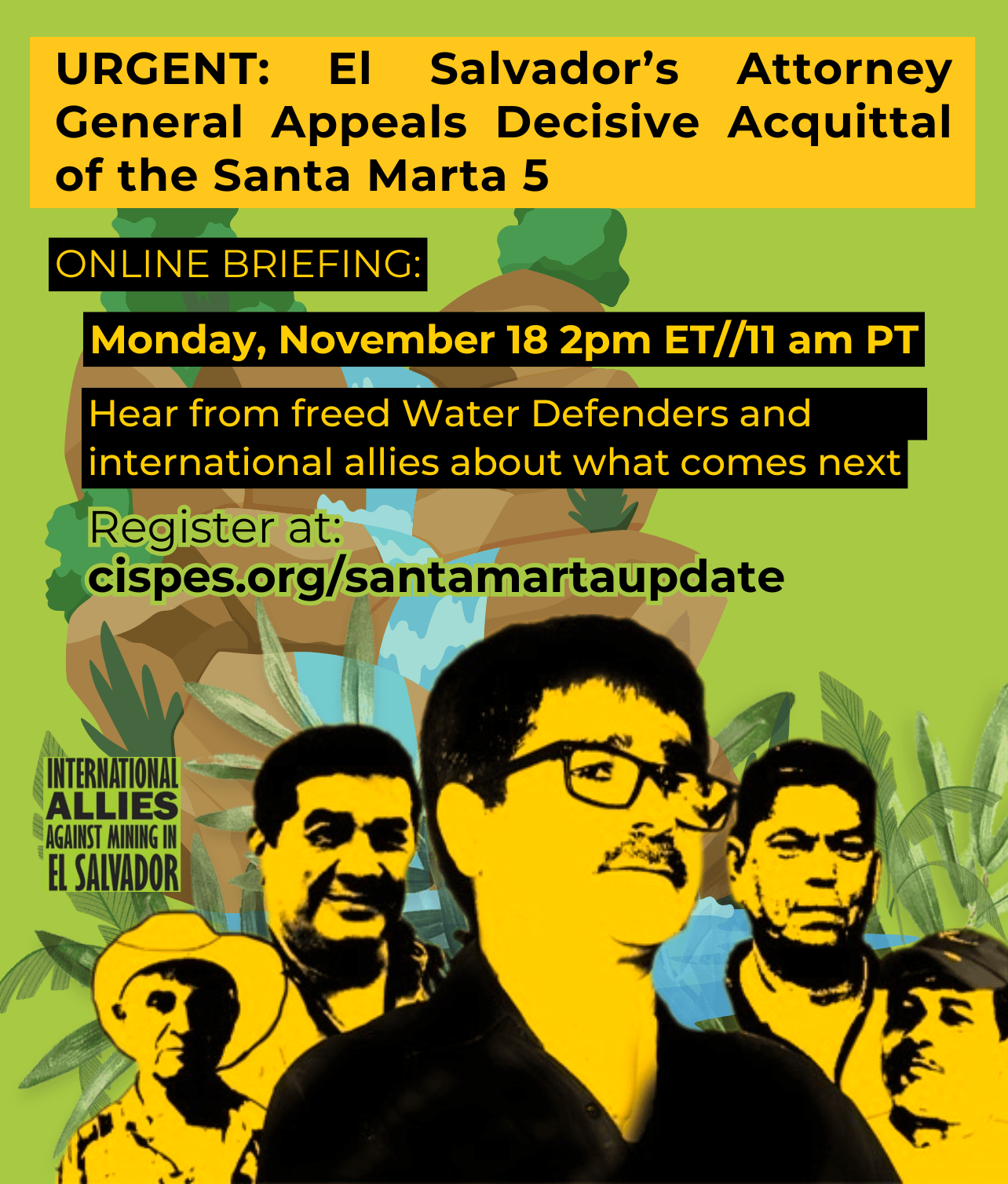- Home
- About Us
- Issues
- Countries
- Rapid Response Network
- Young Adults
- Get Involved
- Calendar
- Donate
- Blog
You are here
IRTF News
News Article
December 1, 2024
In 2017, El Salvador banned all metals mining above ground and below. A broad coalition of sectors, including the Catholic church, supported the prohibition in order to protect the small country’s water resources from contamination.
President Bukele who supported a mining ban during his first campaign for the presidency in 2019 now wants to lift the country’s ban on gold mining and proposes “modern and sustainable” mining that would care for the environment.
“It’s not true that there’s green mining, it’s paid for with lives, kidney, respiratory problems and leukemia that aren’t immediate,” said Amalia López with the Alliance Against the Privatization of Water. The Archbishop José Luis Escobar Alas is also against the President's plans and asked President Nayib Bukele not to reverse the ban.
Event
November 30, 2024
Gather for solidarity to overcome our violent nation and build nonviolence together. There will be an unveiling of a peace & justice poster by a local artist. Vendors will offer their wares. Presentations to be made regarding nonviolent struggles.
Our esteemed speaker: Larry Clark is a United Methodist pastor and a sociologist. He has a Master of Divinity and Master of Arts in Christian Education from the Methodist Theological School in Ohio. He received a Ph.D. in Sociology of Conflict from Bowling Green State University. In retirement he has been filling in a various churches who are without pastors. He is the project director for Bluff Street Village – a tiny home community for low income persons. Larry has facilitated a weekly clergy study for twenty years and has taught Sociology at the University of Toledo. For forty years he has been studying and leading groups in the Holy Land of Israel/Palestine/Jordan
Event
November 29, 2024
12-2pm: The Walk & Fast for Humanity will convene at the Fountain of Eternal Life at 120 Public Square on "Black Friday," November 29, 2024, Noon - 2pm. This is to name four world famines and food insecurity in Cleveland, Ohio. We emphasize the huge Pentagon budget and campaigns that foment poverty and famine in proxy war zones of our government. Famine in Gaza, Haiti, Sudan, and Yemen are our focus. We ask that participants everywhere fast from food, fuel and consumerism on "Black Friday." Readings and songs will be offered. From there we will walk to a public building to address our legislators. We invite you to join us and, if you wish, assist with a reading or song. Please reply to this email maria.smith9907@gmail.com if you'd like to be part of the program, or call Don Bryant at 216.255.1576
Event
November 25, 2024
In preparation for the Black Friday the Cleveland Nonviolence Network and Cleveland Peace Action are hosting a Nonviolence Training. The training will take place at the Pilgrim Congregational Church in Tremont. A registration is not required.
News Article
November 24, 2024
Hundreds of Salvadorans protested to demand the release of “innocent” individuals imprisoned during President Nayib Bukele’s crackdown on gangs.
“Freedom now,” read a banner carried by members of the Victims of the Regime Movement (Movir). Approximately 83,000 alleged gang members have been imprisoned under the state of emergency, which allows for arrests without warrants. However, according to humanitarian organizations such as Socorro Jurídico Humanitario, Cristosal, and Movir, around 30,000 of those detained are “innocent.”
The demonstration, which took place in the historic center of the city, was joined by doctors and teachers calling for improved public services
Event
November 21, 2024
Where is trade policy headed — and what is the role of trade justice activists — now that Donald Trump has won control of the White House?
Join this month’s Trade Justice Power Hour briefing to hear from Lori Wallach of Rethink Trade and Arthur Stamoulis of the Trade Justice Education Fund about trade issues on the immediate horizon when President-elect Trump takes office — from potential tariff increases to renegotiation of the U.S.-Mexico-Canada Agreement (aka, “Trump’s NAFTA”).
As part of the briefing, we’ll hear about the importance of pushing for alternatives to both the business-as-usual, corporate-driven “free trade” neoliberalism that has failed our communities and the corporate-driven “America first” nationalism that stokes hatred while offering only false solutions.
Please send an email to info@tradejusticeedfund.org to register.
News Article
November 20, 2024
The founder and publisher of elPeriódico, one of the most important oppositional newspapers in Guatemala, was ordered to return to jail after a appeals court overturned the order of freeing him.
He was convicted last year of money laundering, sentenced to six years in prison and fined about $40,000. He called the charges politically motivated and said they were retaliation for his newspaper’s focus on public corruption. The case became a sign of crumbling democracy in Guatemala and a symbol of threats against press freedom across Latin America.
The IRTF wrote several letters about Zamora as part of the Rapid Response Network, these are two of them:
News Article
November 19, 2024
During the country’s civil war, in November 1989, a military commando stormed the Jesuit Central American University (Uca) campus, killing its rector, the Spanish priest Ignacio Ellacuría, five of his colleagues – Ignacio Martín Baró, Segundo Montes, Juan Ramón Moreno, Joaquín López y López, Amando López, along with Elba and Celina Ramos.
Now the former president Alfredo Cristiani, a former congressman and nine retired military officials are charged with murder and acts of terrorism over one of the most notorious crimes committed during the 12-year war, which left 75,000 civilians dead and only formally ended in 1992.
Event
November 18, 2024
Join two of the Santa Marta 5 water defenders and representatives from the international campaign for an update of their legal case, and how we can support the Five.
Thousands of individuals and organizations from all over the world have worked with civil society groups in El Salvador for the freedom of the five Santa Marta water defenders who were unjustly arrested in January 2023 and charged with an alleged crime said to have occurred 35 years ago during that nation's brutal civil war. Finally, in October 2024, the five were found innocent of all charges in a court in northern El Salvador. However, the Salvadoran Attorney General has appealed this verdict to a higher court. We will discuss the case and ways the international community can support the Five.
(Spanish-English interpretation will be provided)
register here: https://us02web.zoom.us/meeting/register/tZMvdOiprDouH9Ugdi5E3rB7_US2m4f4VX-x#/registration
News Article
November 7, 2024
IRTF is grateful to the 200 supporters who gathered on October 27 at Pilgrim Church in Cleveland’s Tremont neighborhood for IRTF’s annual Commemoration of the Martyrs. In addition to marking the 44th anniversary of the martyrdom of Cleveland’s missioners in El Salvador (Jean Donovan and Sister Dorothy Kazel, alongside Maryknoll Sisters Ita Ford and Maura Clarke), we commemorated 36 human rights defenders killed in Central America and Colombia this past year because they dared to speak truth to power.
Our keynote speaker, Lorena Araujo of the largest campesino organization in El Salvador (CRIPDES), held the crowd’s attention with horrific stories of mass arrests, detentions and deaths currently happening under their government’s State of Exception, now in its third year. With more 88,000 imprisoned (and more than 300 deaths in prison), El Salvador now has the highest incarceration rate in the world—surpassing the astronomical rate of incarceration in the United States.
As the people of El Salvador face the greatest challenge to their democracy since the end of the civil war in 1992, they invite us to renew and deepen our solidarity.
If you would still like to make a donation:
https://bit.ly/3YDmETj via Zeffy platform
irtfcleveland.org/donate via Network for Good




